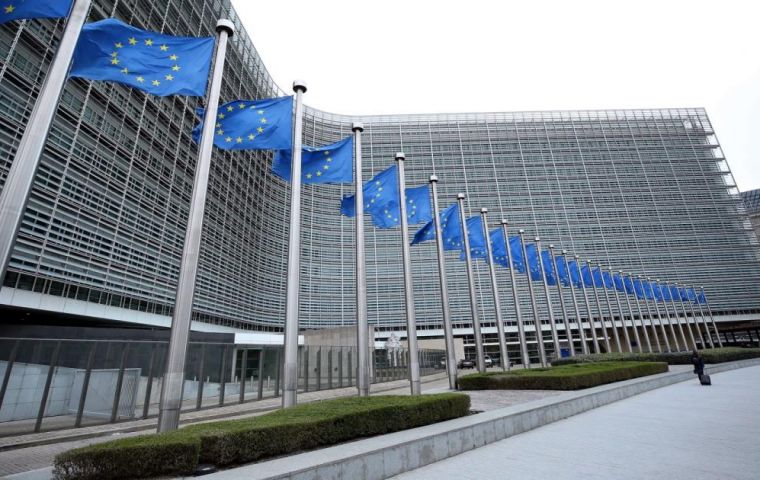MercoPress. South Atlantic News Agency
EU adds ten more countries to the blacklist of tax havens including several British Overseas Territories
 The 15 jurisdictions are on the list because they were either already on the blacklist and had taken no commitment to change or have moved from the ‘grey list’.
The 15 jurisdictions are on the list because they were either already on the blacklist and had taken no commitment to change or have moved from the ‘grey list’. EU finance ministers approved on Tuesday the addition of 10 more countries to the EU’s blacklist of tax havens, which currently includes only five jurisdictions and aims to help prevent tax fraud or evasion.
“The purpose of the list is to encourage cooperation and positive change and not to name and shame,” said Eugen Teodorovici, minister of public finance of Romania, which is currently holding the EU’s rotating presidency.
The five original jurisdictions were Samoa, Trinidad and Tobago, American Samoa, Guam and the U.S. Virgin Islands. Now, Aruba, Barbados, Belize, Bermuda, Dominica, Fiji, Marshall Islands, Oman, United Arab Emirates, Vanuatu have been added.
These 15 jurisdictions are on the list because they were either already on the blacklist and had taken no commitment to change (original five) or have moved from the ‘grey list’ to the blacklist because they failed to implement reforms in the one-year deadline.
The EU finance ministers adopted a list of “non-cooperative tax jurisdictions”, which is another way to label tax havens. The blacklist was created in December 2017 to encourage transparency and fairer tax competition, while preventing and stopping tax fraud, evasion and avoidance.
Those on the blacklist are allowing widespread tax evasion by corporations and individuals and did not meet EU deadlines for reform.
The criteria for moving jurisdictions on and off the blacklist include transparency, information exchange standards, signed bilateral agreement for exchange, fair tax competition, no harmful tax regimes/practices, and the implementation of standards through country reporting.
Member states are discussing other criteria based on beneficiary ownership transparency.
The consequences for those on the blacklist will be more issues with trade and damaged reputation but no sanctions have yet been agreed on by the member states, but those on the blacklist will face poorer trade and damaged reputation.
There is a middle ground ‘grey list’ for countries that are being reviewed and given time to reform. A total of 62 jurisdictions were given one year, until the end of 2018, to comply with EU tax standards. Of the 62, 28 have complied, leaving 34 being monitored, which shows improvement, result and impact, said Vladis Dombrovskis, Commission vice president in charge of the euro.
Andorra is an example of a country that was grey-listed and is now off all watch-lists after completing reforms begun in 2015 due to pressure from the EU.
In effect following the commitments in 2017, many countries have now delivered the reforms and improvements that they promised, and 25 countries from the original screening process have now been cleared: Andorra, Bahrain, Faroe
Islands, Greenland, Grenada, Guernsey, Hong Kong, Isle of Man, Jamaica, Jersey, Korea, Liechtenstein, Macao SAR, Malaysia, Montserrat, New Caledonia, Panama, Peru, Qatar, San Marino, Saint Vincent and the Grenadines, Taiwan, Tunisia, Turks and Caicos, and Uruguay.
Two years after the Panama Papers scandal revealed the scope of tax haven activities, the EU has adopted new legislation and is now better prepared to tackle tax evasion and fraud.
While the blacklist is generally approved of, it is not without criticism. Some think there are particular jurisdictions that should be blacklisted and that the criteria should be stricter.
“The largest offshore financial centers such as the British Virgin Islands, Cayman Islands and the Bahamas would end up on the blacklist where they belong,” said Sven Giegold, Greens/EFA financial affairs spokesperson.
“As Oxfam showed last week, if the same criteria were applied to EU member states, five of them would be on the list, which is why the EU must step up the pressure on its own members to stop dodgy tax practices.”
Teodorovici and Dombrovskis both said during the press conference that the criteria and methodology were the same for every jurisdiction, which was how blacklist decisions were made.
This tax haven blacklist is not to be confused with the EU’s money laundering blacklist, which was due to be debated in the European Parliament on Tuesday, after member states rejected it last week. The current list has 16 jurisdictions, accused of supporting money laundering and terrorism. The rejected new draft had proposed 23 jurisdictions.




Top Comments
Disclaimer & comment rulesCommenting for this story is now closed.
If you have a Facebook account, become a fan and comment on our Facebook Page!